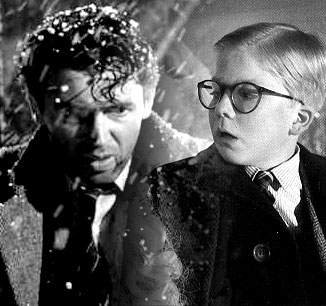
It’s a Wonderful Life vs. A Christmas Story
Written by: Tony Lazlo, CC2K Staff Writer
I realize that Capra and his creative team had nothing like this in mind when they made IAWL, but when I compared the vibe of the ending of IAWL to the fantasy sequence in Vanilla Sky, I saw uncomfortable parallels. The lead characters in both stories fall on hard times with no escape, but at an arbitrary time, everyone in their lives comes together to help them out of it.
https://www.youtube.com/watch?v=ErrzjGCi3gY
Even though Capra wanted to give George (and his audience) an uplifting ending that retroactively gave meaning to George’s disappointing life, I feel like the ending of IAWL is a pure fantasy, and a poorly constructed one at that. I mean, really, isn’t it weird that all these random people from George’s past show up at his house on Christmas Eve to donate money, including his brother, who was in the military? I even find it creepy that George’s daughter Zuzu parrots the bon mot “Every time a bell rings, an angel gets its wings” at the perfect time. Everyone is smiling at the end of IAWL, but it feels phony, discordant and creepy – like we’re listening to the Freddy Kreuger kids sing Christmas carols in their trademark minor-key falsetto.
Furthermore, Bedford Falls looks like an antiseptic, Norman Rockwell bore compared to the far more realistic Pottersville. I’m certainly not the first pop-culture pundit to note the awesomeness of Pottersville, but more than its jumpin’ atmosphere, I’d like to compare downtown Pottersville to another city: the 1950s image of Gary, Ind., portrayed in Bob Clark’s A Christmas Story.
My comparison is simple: Pottersville and the Gary, Ind., seen in ACS look enough alike that if you were trapped in Bedford Falls, you could escape into the real world by finding a portal to Pottersville (probably located near the bridge where George almost kills himself) and from there find another portal into Gary, Ind.
IAWL and ACS both draw on Rockwellian nostalgia, but where IAWL indulges its audience with borderline dangerous, middle-America escapism, ACS strips away the rosy cheeks and friction-free meringue of Rockwell’s Utopian America and leaves behind a world that, although heightened by 1950s nostalgia, nonetheless indulges no fantasies and revels in a canny, charming cynicism.
Instead of a bullshit, fantastic ending where everyone opens their hearts (and wallets) to George Bailey, ACS acknowledges Christmas’ commercialized, materialistic core and uses it as the story engine for a terminally good-hearted narrative about the insanity of childhood that recalls the madcap populism (and robust humor) of John Irving.
It is a cosmic rightness that the voice of Fozzie Bear is also the voice of Yoda. It is also a cosmic rightness that the director of Porky’s directed ACS. Clark’s offbeat sensibility merges well with author Jean Shepherd’s source material – a selection of stories taken from his collection In God We Trust (All Others Pay Cash).
(Side note: I couldn’t find a Rockwell painting called “In God We Trust.” I can’t believe there isn’t one.)
Clark recognized Shepherd’s wry tone and channeled it into a movie that has loads of tang, from Ralphie’s swearing (everything from “son of a bitch!” to “fudge!”) to the unrepentant sexuality of the infamous leg lamp.
But I’d like to single out one scene from ACS for recognition: The scene where Ralphie kicks Scut Farkus’ ass.
The Scut Farkus character, fittingly enough, stepped out of a hundred Rockwell paintings, right down to his blue jeans and Davy Crockett cap. You’d think this rosy-cheeked creation would have blue eyes, but that’s where his similarity to the world of Rockwell ends, as Shepherd narrates:
Scut Farkus! What a rotten name! There he stood, between us and the alley. Scut Farkus staring out at us with his yellow eyes. He had yellow eyes! So, help me, God! Yellow eyes!
Scut torments Ralphie and his friends for most of the movie, but when Ralphie gets a bad grade on a big assignment, Scut has the bad fortune to cross him. Skip ahead to timestamp 2:21 to see Ralphie bring the pain:
https://www.youtube.com/watch?v=Sz4lC7XH5S0
After the fight, notice how Scut doesn’t have a black eye so much as a smear of blood across his face. After Ralphie’s mom pulls her son off the bully, she takes him home – and Scut sits up, looking a lot smaller.
Back at Ralphie’s house, his mom cleans him up and sends him to his room to calm down and rest. Meanwhile, Ralphie and his little brother fear that their dad is going to “kill” Ralphie for swearing so much while he was kicking Scut’s ass (keep in mind the deep shit Ralphie got into for letting the F-word slip).
But when their dad gets home, Ralphie’s mom covers for him. Righteous.
I realize I’m drawing an obvious parallel here with my feelings about Rockwell’s “The Winner,” but fuck it: Bob Clark and Jean Shepherd tell us the truth. Families live in houses with bum radiators. Kids lust after Christmas presents (and “the hot glow of electric sex”). And sometimes grown-ups recognize the righteousness of kicking a bully’s ass.
By being uttered in the same breath as It’s a Wonderful Life, A Christmas Story has become a Trojan horse for good-natured, secular realism. Don’t get me wrong – I still get misty-eyed watching It’s a Wonderful Life (I can’t help it), but I hate myself for it. A Christmas Story makes for the perfect palette cleansing – even if it takes 24 straight hours of it to make the taste of Capra’s nonsensical Rockwellian con job to go away.

